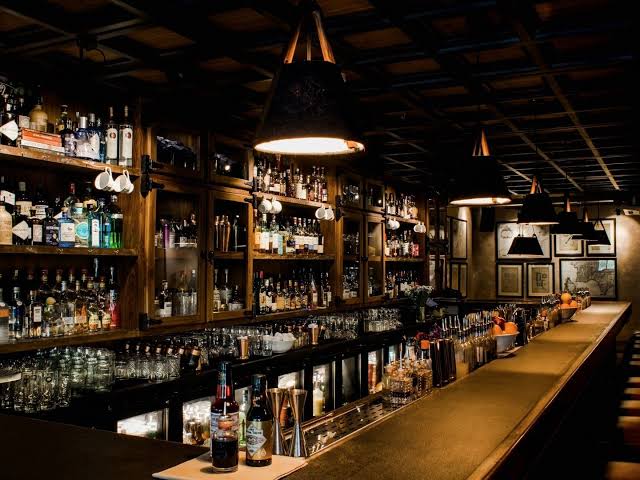What has truly charmed the trade and tipplers alike about the country’s cocktail game, in recent times, is the constant reinvention. With a flourishing subculture of cocktail experiences, what is happening at bars, experiential dining places, even microbreweries, has evolved into thought-provoking concepts, nuanced storytelling, celebration of provenance and nostalgia in a bid to woo the oohs and aahs! We’ve bid adieu to the idea of creating a menu that’s split between families of cocktails and various other spirits. Now, celebrated watering holes look at menus as timeless plays and novels that are almost like collectibles. These menus have become a window into the host city’s glory, the country’s hidden crafts, and stories from the past, all served up with a dash of showmanship and sensibility-driven hospitality. More than a just post-work pit stops, they’ve become destinations worth a special journey. Bartenders too, are graduating to don multiple hats: Modern therapists, theatre artists, a ‘griot’, a confidant. Here is our selection of some of the most ingenious, intriguing and interesting bar menus that is sure to leave you shaken and stirred.
PCO BOMBAY, LOWER PAREL, MUMBAI
Eleven years on, the capital’s first speakeasy bar, PCO Delhi, still commands a queue every weekend. Their younger Mumbai outpost, once the home to a textile mill, celebrates its new menu in unique style. It’s an ode to the textiles of the city, and understandably, a tough act to follow up on in terms of menu or execution. To celebrate the heritage of Indian textiles, the team has tried to capture the journey from its inception to execution, incorporating their sheen, texture, and flavour of occasion as interpreted in a glass. Brocade, an ornamental fabric, has connections with Japan and America, and so the cocktails solicits a Bourbon and Umeshu. Smartly, it features a gold pattern to accentuate its rich look. To visualise the richness, the garnish is a chocolate disk dusted with gold. Another drink that captured my attention was Paithani, a 2,500-year-old, shimmering Maharashtrian woven fabric with gold zari that’s worn on special occasions, which is also marked by cooking a karela (bitter gourd) sabzi. The drink is a mix of Pistola Reposado, an aged Indian agave spirit, vermouth, and karela liqueur. When was the last time, rather the first time, you went to a bar and found karela on the menu? This leap of confidence in itself is worth a cheer. And there’s more—Raw Silk, Kalamkari, Chiffon, Corduroy, Velvet… stay curious and experience them on your own. The menu also features a sample of the cloth to touch-and-feel, and generously mentions the names of the bartenders who have created these brilliant masterpieces. The bar has been raised!
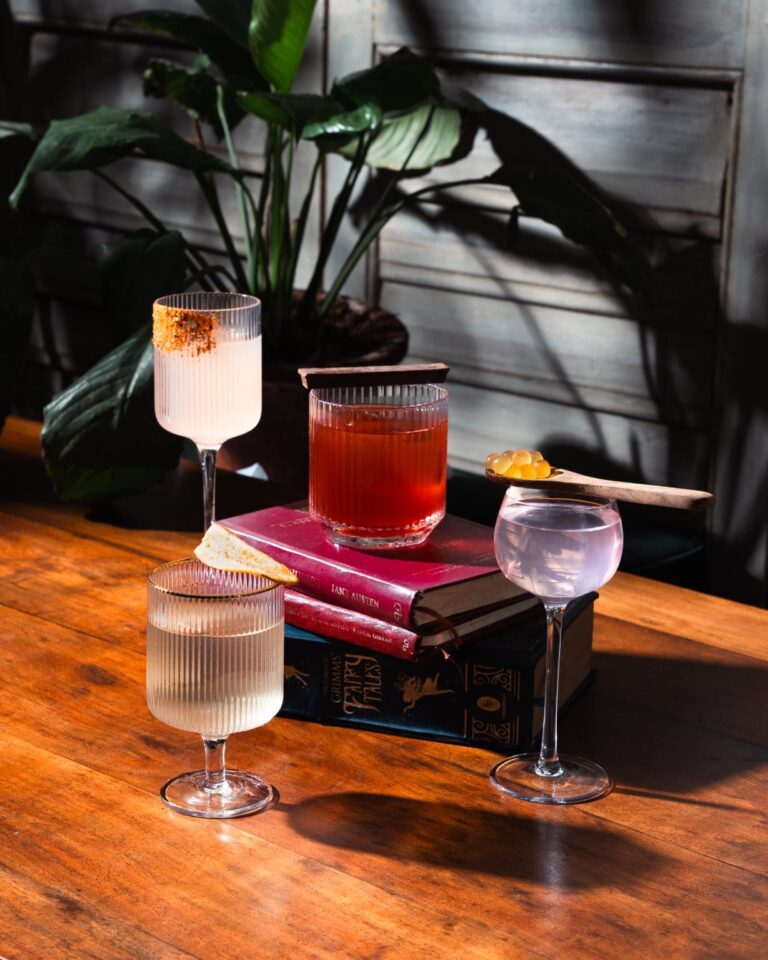
FORT CITY BREWIN, HAUZ KHAS, DELHI
With Fort City, Ashish and Gautham set out to create Delhi’s first proper microbrewery. Adding a new flavour to the city’s beverages, it was only fitting that their cocktails captured Delhi’s essence as well. Their eight-drinks menu, called ‘Takht-e-Delhi’, is a delicately curated repository of stories, and an interpretation of the city’s eight forts, ruled by eight different dynasties. The menu begins from Lal Kot, Delhi’s first fort, and travels through Mehrauli, Siri, Tughlaqabad, Shergarh, Shahjahanabad, Firozabad, and finishes at the current seat, New Delhi. The creations are good enough to turn any one into a history enthusiast. They captured the emotion from each empire in these drinks, with flavour profiles that stretch between bitter, sweet, calming, or aggressive, all bound with tales from the era. Take for example Shergarh, home to Humayun’s Tomb, the first garden tomb in India. The tomb takes inspiration from the ‘Jannat Adn’, or the Garden of Eden from the Bible. Their confluence of the four rivers—water, honey, milk, and alcohol—marks the conclusion of the seven heavens and the initiation of the ‘Hasht Behesht’; the eighth heaven being reserved for gods and angels. The drink features Rosemary-infused gin, marking the greenery of the gardens, whey, which symbolises the river of milk, and honey syrup, finishing with red-hued bitters, personifying the tomb floating above the eighth heaven. Mehrauli translates into the famous Phoolwalo ki Sair, an annual celebration since 1812. A distraught Mughal queen vowed to visit the mosque of Khwaja Bakhtiar ‘Kaki’ on the condition that her son was released for mischievously shooting at the then British Resident at the Mughal court. The prince was miraculously released and the mother fulfilled her vow by presenting a chaadar (veil) of white flowers at the mosque. The priest, however, suggested she also visit the Yogmaya Temple, the only one dedicated to Lord Krishna’s sister. She obliged, marking the beginning of religious harmony in the city. The drink is an amalgamation of Jasmine-infused gin, vermouth, and orange bitters, with a garnish of green apple topped with brulee-ed red bitters. The green-red hued garnish symbolises the harmony between the mosques and temples of the city, to mark the era. Fort City’s menu narrates lost stories to its locals, and travellers alike, and, for a while, allows them to take pride in the city which is a living museum of monuments and a library crowded with storybooks.
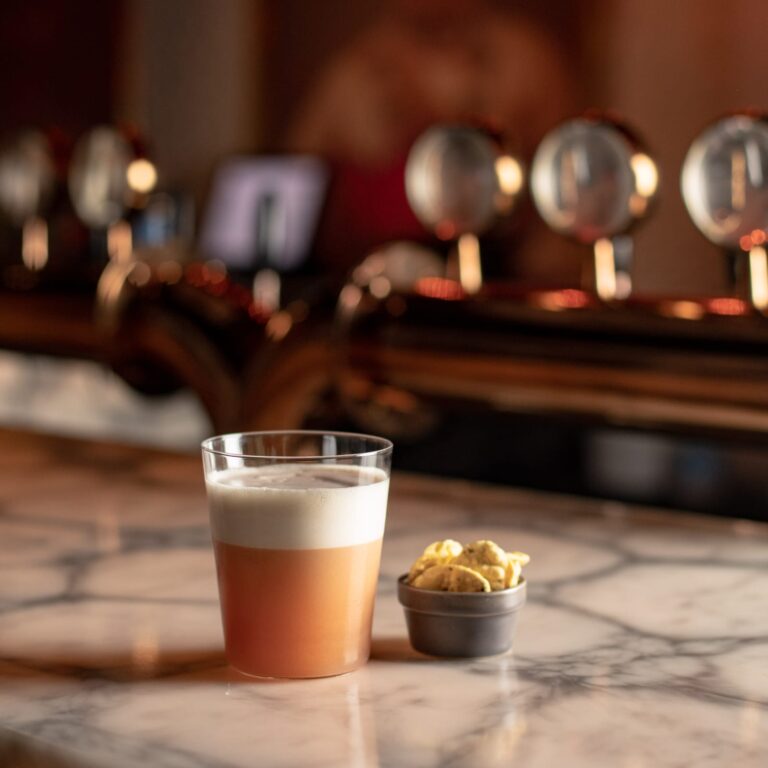
THE BOMBAY CANTEEN, LOWER PAREL, MUMBAI
An institution unto itself, TBC is a rare feat because its food as well as drink offerings are just as remarkable. With constant innovation, its menus keep evolving to become a window unto the city. Over the past eight years, their cocktails menu has celebrated several facets of Mumbai’s fascinating urbanscape. From art deco buildings to street slang, to its famous talkies, to characters you will likely encounter at the promenade, they’ve all found pride of place in the glass. Now on to their fifth menu, the team has carved out iconic parts of the city and its mood at a certain time of the day. The menu starts from capturing Dadar’s flower market at 5 am and wanders through the bustling city in a kaali peeli taxi finishing sleeplessly in Bandra at 1 am. As the day and the rush of the city progresses, the style of drinks evolve accordingly—from morning highballs maturing to spirit-forward sippers er dark. Steering away from just gins and whiskies, TBC aims at showcasing a great cocktail that is indifferent to the choice of spirit. The idea: A well-presented, carefully thought out and curated drink will find takers, without focusing excessively on any specific spirit. Not just a play of spirits, even the ingredients are rather interesting. Rear View, for instance, exemplifies being stuck in traffic in the back of a cab at 11:11 pm somewhere in the city. This is a Tequila-based drink with a curious mix of black garlic, ginger, honey, and lemon. It’s brave to put garlic in a drink, and even more ambitious to have someone not just like it, but reorder and pay for it. Another one is Duty Free that makes a connection between Mapusa in Goa and Mahim Junction at 4 pm, exactly when the Mumbai-bound buses from Goa reach the city. Duty Free brings together Feni, Pinot Noir wine, Indian Sarsaparilla, pineapple, coconut milk, and ginger. Even for a sommelier, who works with flavours all the time, putting to bed all these nuances together sounds riveting. So if you’re a Bombay virgin and crave a crash course to the city in all its varying moods and whims, TBC helps you distil the journey through the prism of the glass.
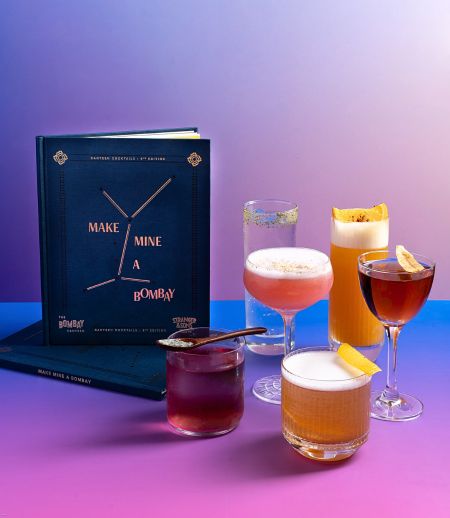
SIDECAR, GK-2, DELHI
Adjudged among one of the world’s best bars, Sidecar is no longer considered to be just a watering hole, but a university learning for the drinks business, on either side of the till. Their new menu is the result of travels in all directions from the capital. It brings home the essence from Uttar Pradesh, Maharashtra, Eastern Himalayas, West Bengal, Karnataka, and more. ‘Arq—The Essence’ allows us to relive the nostalgia of familiar flavours and aromas, transporting us to shared memories of everyone’s wonder years. How can one not relate to the aroma of the tempering of curry leaves, or freshly chopped cilantro, the unofficial national garnish of all Indian cuisines? It could be as simple as the morning ritual of a cup of chai or the apres dinner luxury of a freshly crafted paan. I’m not a tea drinker, yet, Sidecar’s Tea Leaf cocktail featuring Bourbon infused with mountain pinewood tea that lends a whiff of smoky hues and a tannic mouthfeel, combined with the tart, earthy ginger and the sweetness of the whisky is a charming play of sorts. Simple, delicious, yet elegant, the drink is perfect for a balmy autumn evening. If not that, catch the Darjeeling mugwort cocktail, which could be a bit of an acquired taste for Delhiites, but for the mountain people of Darjeeling, it serves as more than just a usual ingredient. Mugwort is a bitter leaf that acts as a medicine, mosquito repellent, incense, a herbal tea, and even used to flavour the local fermented drink ‘chhanng’. With their signature attar from Kannauj, handmade chocolates from Mysore, Bengali Gondhoraj, and other celebrated ingredients, Sidecar draws on the tug of nostalgia to reconnect with the fleeting innocence of memories past.
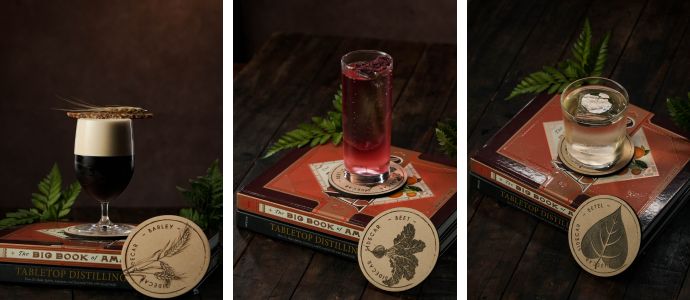
EKAA, FORT, MUMBAI
To stand out of the crowd, you’ve got to stand alone. Ekaa does that on multiple levels to become the lynchpin of SoBo bars. From its inception, their drinks have been neat, with inventive storytelling, and driven by idiosyncratic personalities that elicit engaging conversations with the cocktail at hand. Ekaa’s new menu accentuates ayurvedic elements, without making a blatant in-your-face statement. The idea is an extension of what has been Ekaa’s food and drinks philosophy from the get-go-toying with under-appreciated botanicals and making them sexy! With cinnamon, cardamom, coriander bordering on mundane, it was expected for them to draw on herbs, botanicals, and eyebrow-raising ingredients into play. The team researched over 80 new ingredients, travelling between Nagaland, Tamil Nadu, Goa, the Himalayas, and Delhi. While most of these have found pride of place in the Vedas and Shastras, they are still new to the trade professionals and guests alike. Who would have thought that Ayurvedic doctors would be the new suppliers to the bar! Imagine the lure of Damanaka, Kapur Kachri, Talispatra, Anantmul, Timbur, Myrrh, and there’s more. The menu is simple, just an AI-drawn image of the champion herb or botanical, its botanical name, list of ingredients, place of origin, but without a mention of the style of drink—coupe, sour, highball—which then becomes a talking point, while guests wait to be enamoured. Here, storytelling is the key, hence the bar’s service style is relaxed, conversational, and solicits those who prefer the conforting cocoon of a slow life. Take Brahmi for instance; the bittersweet leaf provides cooling effects and enriches the body and mind alike, hence called the Brain Tonic. Marry it with the earthiness of a Japanese whisky and the grit and tannins of a red wine, sweetness of pears, and the aromatic goodness of cinnamon, and you’ve got a champion drink. If you’ve witnessed Shivratri celebrations, you know of Bael Patra. When it makes its way to Ekaa, Vodka, JasminE syrup, bubbles, and the leaves, form a Picantestyled charmer. For the uninitiated, trying Bael Patra might already be brave enough; to ease them in, a touch of smoked chillies adds the homely comfort similar to a local thecha (spicy condiment from Maharashra). This yin-and-yang of competing flavours, trying to curry favour with the new, while holding on to the comforting and familiar is how Ekaa is converting one drink at a time.
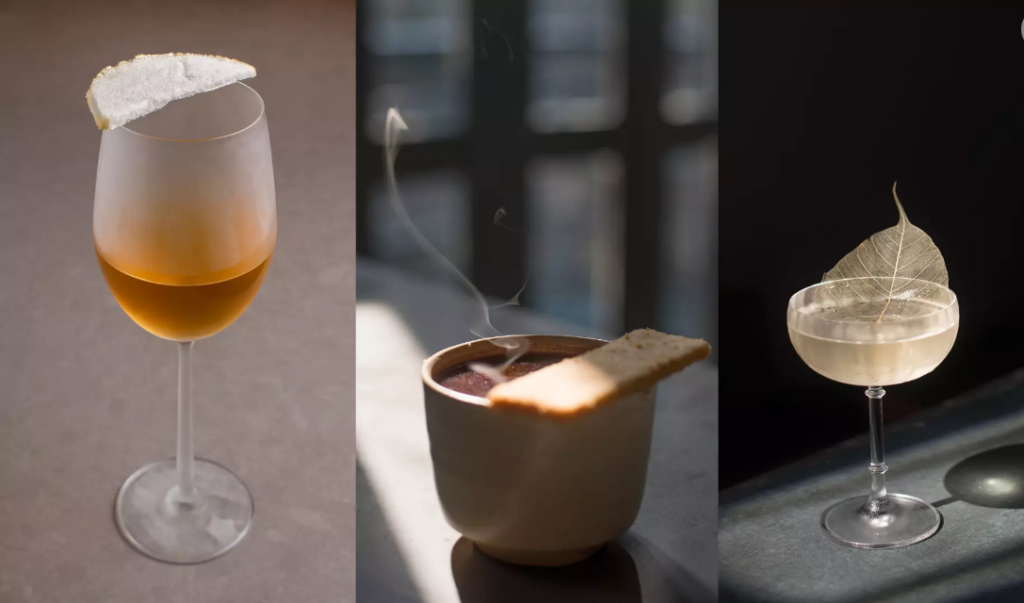
First published in India Today Spice, October 2023

